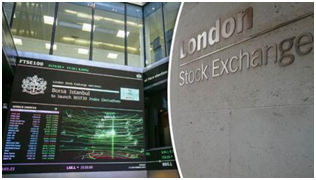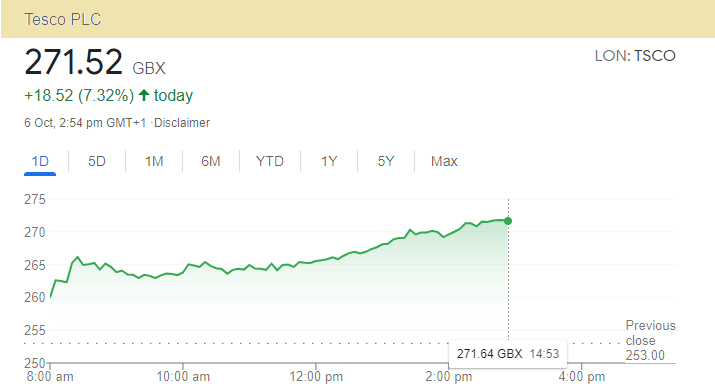
Fears of increased inflation weighed on London’s blue-chip stocks on Wednesday, although grocery chain Tesco topped the index thanks to a positive yearly outlook and good first-half results.
Diageo (DGE.L), Unilever (ULVR.L), and Astrazeneca (AZN.L) were among the major drags on the FTSE 100 index (.FTSE), which fell 1.5 percent to its lowest level since August.
As cost pressures continue to mount, a recent poll indicated that more British firms want to raise their prices than at any previous time in the last three decades.
As central banks look to withdraw their pandemic-era monetary support and boost rates to soothe cost pressures, equities have been pulled down by rising inflation expectations fueled by growing energy costs, supply side, and labour shortages.
“There’s a lot of concern about rising inflationary pressures arriving at the same time as indications that the UK recovery is weakening, and fears of stagflation are developing as well,” said Stuart Cole, Equiti Capital’s head of macroeconomics.
After bond yields touched their highest level since May 2019, indicating rising inflation pressures, banking stocks (.FTNMX301010) surged over 1%.
On re-opening hope and encouraging monetary policies, the FTSE 100 has recovered around 40 percent from its pandemic lows in March 2020 and around 8% so far this year.
After UBS boosted its target price and raised the stock to “buy” from “neutral,” HSBC Holdings (HSBA.L) pulled ahead.
After Barclays dropped the sub-index to “underweight,” the domestically focused mid-cap index (.FTMC) plummeted 1.3 percent to a near three-month low, with consumer discretionary stocks leading drops.
PageGroup PAGE.L, a global recruiting agency, rose 6.9% after raising its earnings projection.
Imperial Brands (IMB.L), a tobacco company, slumped 2.4 percent after saying it was on pace to meet its full-year operational profit prediction.
Tesco overcomes supply chain issues to boost earnings forecasts.
Tesco (TSCO.L) gained 7.3 percent after upgrading its full-year profit forecast following good first-half results.

Also Read: Top 10 UK Stocks to Buy Now
“Sales and profits have increased above expectations, and we’ve beaten the market,” stated Executive Chairman Ken Murphy.
“With a variety of difficulties now affecting the industry, our supply chain’s resilience and the breadth of our supplier partnerships have once again shown to be a valuable advantage.”
The company said on Wednesday that its good performance has allowed it to reduce gross debt by 1.7 billion pounds ($2.3 billion) from February, allowing it to buy back shares for the first time, with the first 500 million pounds to be purchased by October 2022.
Its shares jumped 5% in early trading, outperforming the FTSE 100 index.
Tesco expects a full-year modified retail operating profit of 2.5-2.6 billion pounds, down from its earlier prediction of 2.3 billion pounds for 2019-20.
With a 27 percent share of the British grocery industry, the firm reported an adjusted retail operating profit of 1.39 billion pounds in the first half, beating analysts’ expectations of 1.26 billion pounds and 1.19 billion a year ago.
Tesco’s enormous online business, its goal to match prices at German-owned discounter Aldi on approximately 650 lines, and the success of its ‘Clubcard Prices’ loyalty program, according to analysts, are all contributing to its success.

Leave a Reply